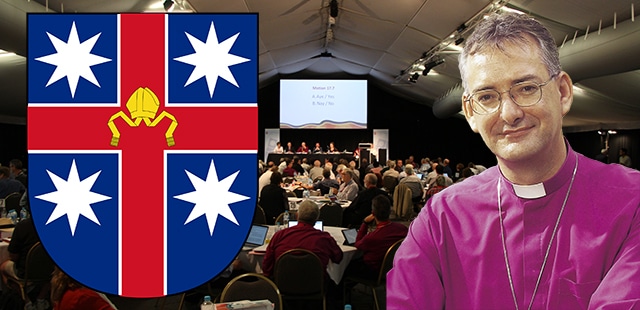Adelaide’s Archbishop Geoffrey Smith and Tasmania’s Bishop Richard Condie fail to secure required majority to win

By Mark Brolly
17 March 2020
The election of a new Anglican Primate of Australia to succeed Melbourne’s Archbishop Philip Freier is unresolved, with Archbishop Geoffrey Smith of Adelaide reportedly falling only one vote short in the House of Clergy in four of the seven ballots held by the Primatial Board of Electors in Sydney on 14 March.
Archbishop Smith, who has led Adelaide’s Anglicans since 2017, and Tasmania’s Bishop Richard Condie, a former Archdeacon of Melbourne and Vicar of St Jude’s Carlton who became the Apple Isle’s Anglican leader a year earlier, were the only candidates from the third ballot after the Northern Territory’s Bishop Greg Anderson, Brisbane’s Archbishop Phillip Aspinall, Canberra-Goulburn’s Bishop Mark Short, Newcastle’s Bishop Peter Stuart and Ballarat’s Bishop Garry Weatherill were eliminated.
Dr Aspinall, who was Primate from 2005-14 and will be acting Primate until Dr Freier’s successor is chosen, was the only candidate other than Archbishop Smith and Bishop Condie to reach the second ballot.
He is expected to chair this year’s General Synod, which is due to be held from 31 May to 5 June in Maroochydore on Queensland’s Sunshine Coast, as was the 2017 General Synod – although the global coronavirus emergency casts some doubt about whether it will proceed then.
The Standing Committee of General Synod is due to meet in Sydney from 17–18 April, little more than six weeks before the Church’s national parliament is to convene in Maroochydore to discuss issues including human sexuality and the authority of Scripture.
Dr Freier’s resignation as Primate takes effect on 31 March. He announced last November that he would step down before his term was due to expire and would not seek re-election but that he would continue as the Archbishop of Melbourne, a role he has held since 2006.
Sydney Anglican priest and blogger the Revd David Ould wrote on davidould.net that following what had been described to him as “a very carefully orchestrated plan”, conservative electors for the new Primate had prevented the election of a new leader who would not uphold the doctrinal integrity of the Anglican Church of Australia.
Mr Ould wrote that the strategy was to go “all in” for Bishop Condie, who is the Australian Chairman of the Global Anglican Future Conference (GAFCON). GAFCON declares its intention to reform the Anglican Church by promoting a positive and vibrant biblical orthodoxy and to support Anglicans who take a stand against “false teaching and error”.
He wrote that Archbishop Smith, “previously considered the default option” for Primate, had disappointed conservatives in his time in Adelaide.
“(Bishop) Condie’s nomination was always going to be controversial,” Mr Ould wrote. “As chair of GAFCON Australia he was a figure that many could not accept. Nevertheless, conservatives maintained the argument that he was the only viable candidate who genuinely upheld doctrine and polity at this crucial time. Conservative strategy was predicated on the requirement to gain a majority in all three houses. Six conservative clergy votes would be sufficient to hold out against alternate candidates.”
Images of ballot results on Mr Ould’s blog show that as early as the third ballot, Archbishop Smith achieved a clear majority over Bishop Condie in the Houses of Bishops and Laity – 15-8 and 9-3 respectively – but that he fell two votes short of the Tasmanian in the House of Clergy, 5-7. Archbishop Smith won a total of 29 votes to Bishop Condie’s 18 but to succeed, he needed a majority in all houses.
In the fourth ballot, Archbishop Smith drew level with Bishop Condie 6-6 in the House of Clergy but in subsequent ballots was unable to achieve a seventh vote that would have won him the Primacy.
The Board of Electors is expected to meet again before 30 June, although no date has been set.
If Archbishop Smith were to be elected Primate, he would be the first Archbishop of Adelaide to hold the post – although Dr Keith Rayner became acting Primate in 1989 while Archbishop of Adelaide, but had taken office as Archbishop of Melbourne (succeeding the late Dr David Penman) when he became Primate in 1991.
The election of Bishop Condie would be historic as no bishop who was not a metropolitan has been Primate of the Australian church.
More than half of Australia’s 15 Primates have led the church in Sydney but Sydney’s Archbishop Glenn Davies is to resign on 19 July, shortly before his 70th birthday. An election synod to choose a new Archbishop of Sydney has been set for the week beginning 10 August.
Archbishop Freier was elected Primate immediately before the 2014 General Synod in Adelaide and was formally installed into the office by Archbishop Justin Welby of Canterbury at St Paul’s Cathedral Melbourne on 13 August that year.






